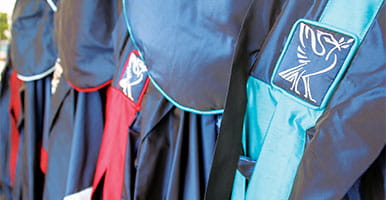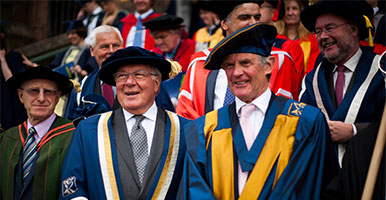Sir Malcolm Thornton
Presented by Alison Wild
Honourable Pro-Chancellor, I have pleasure in presenting Sir Malcolm Thornton for the award of an Ambassador Fellowship from Liverpool John Moores University.
This is a truly dynamic, civic university, firmly rooted in this extraordinary city, and its defining ethos is represented by three deceptively simple yet very powerful words: dream, plan, achieve.
Each July during Graduation Week, the University's highest honour – an Honorary Fellowship – is bestowed on a select band of individuals from outside the University, in recognition of their outstanding achievement in a given field or profession, and who personify the University's ethos and go on to inspire others to 'dream, plan, and achieve.'
It is a particular personal pleasure for me to undertake the oration for Sir Malcolm today because, in my role as University Secretary, I have been privileged to work directly with him throughout his time as Chairman of the University's Board of Governors, of which more later. An Ambassador Fellowship is conferred on those Fellows who have given exceptional service to the University over many years.
We propose Sir Malcolm today in recognition of his outstanding contribution through the Board of Governors to the strategic progress of the University and its governance, not only over a significant period, but also one which featured rapid, turbulent and unprecedented change in the UK higher education sector.
In recognising Sir Malcolm's contribution to University affairs, we should also show appreciation for his wife, Lady Rosemary's unstinting commitment and active participation in support of that contribution over the years. Mentioning Lady Rosemary is also timely as we can note with pleasure her own impending graduation this week as MA of the University of Manchester.
Born in Manchester in 1939, he moved to Wirral in 1947 and was educated at Wallasey Grammar School and the Liverpool Nautical College, which is a foundation college of the present-day Liverpool Maritime Academy in the University's School of Engineering, Technology and Maritime Operations. In 1962, he became a River Mersey Pilot, gaining a Senior First Class Licence.
He was elected as a local councillor in his mid-twenties and spent the next 14 years representing his community on the Wallasey Borough Council and later the Wirral Metropolitan Borough Council. He was Leader of the Wirral Metropolitan Borough Council between 1974 and 1977.
He developed his incisive understanding of the issues affecting education in the late 1970s, representing the Merseyside District Councils at national level, becoming Chairman of the Education Committee of the Association of Metropolitan Authorities, and of the Council of Local Education Authorities.
Malcolm's election as the Conservative MP in 1979 for Liverpool Garston heralded an 18-year Parliamentary career, during which time his concern for education and employment issues came to the fore. He was a member of the Commons Select Committee for Education and Employment for 14 years from 1985 and Chairman of that influential committee between 1988 and 1997.
It was during this period that the Further and Higher Education Act 1992 came onto the statute books, which saw Liverpool Polytechnic become Liverpool John Moores University. He also served as Parliamentary Private Secretary to Secretary of State Patrick Jenkin, first at the Department of Industry, then at Environment, between 1981 and 1984.
It was whilst at the Department for the Environment that he played a pivotal role in securing Freeport status for Liverpool. He was knighted for services to politics in 1992.
His maritime background manifested itself through membership of the Parliamentary Shipping and Shipbuilding Committee between 1979 and 1981. He represented Liverpool Garston until 1983 and then Crosby until 1997, after which he returned to his maritime roots as Chairman of the Trustees of the Mersey Mission to Seafarers.
He successfully oversaw its amalgamation with their sister charity, the Apostleship of the Sea, and became co-Chairman of the newly-established Liverpool Seafarers Centre. He joined the Board of Governors of the University in 2001 and, following four years as Chairman of the Audit Committee, became Chairman of the Board and Pro-Chancellor in 2007, a position he held until earlier this year. During his tenure as Chairman, and against a backdrop of rapidly-evolving external events that have changed the face of higher education in this country, he has brought consummate skills to the performance of this senior leadership role and made a notable and continuing contribution to the University's development and mission.
He employed his wealth of experience and wide-ranging contacts to help establish the pioneering 'World of Work' graduate employability programme that is an integral feature of study at LJMU. He has overseen a £160 million campus investment programme and has ensured that the student experience has remained at the very core of everything that the University does.
As befits a former Mersey Pilot, he has steered a safe course for the University through extremely choppy waters. In appreciation, we give you the best of the traditional Pilots' greetings and wish you "Good Ships, and Many of Them".
In all, and by any measure, this has been an exceptional contribution not only to national affairs, but in particular to the life and development of the University.
Thus, it is with great pleasure that I present Sir Malcolm Thornton, this most distinguished son of our City, for admission as an Ambassador Fellow of Liverpool John Moores University.



